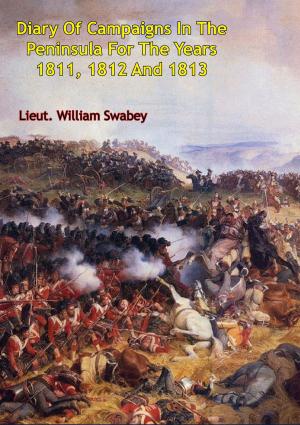History Of The War In The Peninsular And In The South Of France, From The Year 1807 To The Year 1814 – Vol. I
Nonfiction, History, Spain & Portugal, France, Military| Author: | General William Francis Patrick Napier K.C.B. | ISBN: | 9781908902184 |
| Publisher: | Wagram Press | Publication: | June 6, 2011 |
| Imprint: | Wagram Press | Language: | English |
| Author: | General William Francis Patrick Napier K.C.B. |
| ISBN: | 9781908902184 |
| Publisher: | Wagram Press |
| Publication: | June 6, 2011 |
| Imprint: | Wagram Press |
| Language: | English |
William Napier, was born in Dublin in 1785, one of a number of brothers who entered the British army and excelled in the service although it is his History of the War in the Peninsular that he is most remembered for. A masteful, epic account of the Spanish Ulcer that drained Napoleon's resources and played a pivotal role in the end of his domination of Europe.
Napier gained his first commission as an ensign in the Royal Irish Artillery in 1800. By the time of the Napoleonic Wars he had transferred to to the 52nd Regiment, which was being trained as light infantry at Shorncliffe under Sir John Moore. Napier saw his first service in the Peninsular with the 43rd Foot under Sir John Moore during the Corunna campaign. Napier would go on to be conspicuous in the actions of the Light Division, such as the epic march to Talavera, the battles of Fuentes d’Oñoro, Salamanca, Nivelle, Orthes and Toulouse. He left the service a General and Knight Commander of the Order of Bath.
In this first volume (1807 to beginning of 1809), Napier surveys the scene in mainland Europe and particularly Spain and Portugal, the rotten state of politics in Spain, the isolation of Portugal as the only ally of Great Britain still not under Napoleon’s domination. He starts with the machinations of the French to supplant the Bourbon regime in Spain and the joint Franco-Spanish invasion of Portugal with its flood of French troops supposed friends soon to be enemies. The initial disastrous campaigns of the splintered Spanish armies are written of in great detail, battles such as Rio Seco and Ucles, and the parlous state of the Spanish government are shown in all their infamy, juxtaposed to the second defence of Sarragossa by the valorous Spaniards. Wellington’s first short-lived campaign in Portugal, including the battle of Vimiero is given due attention and much is lavished on the campaign of Sir John Moore.
A Classic, deserves to be read and re-read.
William Napier, was born in Dublin in 1785, one of a number of brothers who entered the British army and excelled in the service although it is his History of the War in the Peninsular that he is most remembered for. A masteful, epic account of the Spanish Ulcer that drained Napoleon's resources and played a pivotal role in the end of his domination of Europe.
Napier gained his first commission as an ensign in the Royal Irish Artillery in 1800. By the time of the Napoleonic Wars he had transferred to to the 52nd Regiment, which was being trained as light infantry at Shorncliffe under Sir John Moore. Napier saw his first service in the Peninsular with the 43rd Foot under Sir John Moore during the Corunna campaign. Napier would go on to be conspicuous in the actions of the Light Division, such as the epic march to Talavera, the battles of Fuentes d’Oñoro, Salamanca, Nivelle, Orthes and Toulouse. He left the service a General and Knight Commander of the Order of Bath.
In this first volume (1807 to beginning of 1809), Napier surveys the scene in mainland Europe and particularly Spain and Portugal, the rotten state of politics in Spain, the isolation of Portugal as the only ally of Great Britain still not under Napoleon’s domination. He starts with the machinations of the French to supplant the Bourbon regime in Spain and the joint Franco-Spanish invasion of Portugal with its flood of French troops supposed friends soon to be enemies. The initial disastrous campaigns of the splintered Spanish armies are written of in great detail, battles such as Rio Seco and Ucles, and the parlous state of the Spanish government are shown in all their infamy, juxtaposed to the second defence of Sarragossa by the valorous Spaniards. Wellington’s first short-lived campaign in Portugal, including the battle of Vimiero is given due attention and much is lavished on the campaign of Sir John Moore.
A Classic, deserves to be read and re-read.









![Cover of the book With An Ambulance During The Franco-German War [Illustrated Edition] by General William Francis Patrick Napier K.C.B.](https://www.kuoky.com/images/2014/june/300x300/9781782891598-5bao_300x.jpg)



![Cover of the book 1815 — Waterloo [Illustrated Edition] by General William Francis Patrick Napier K.C.B.](https://www.kuoky.com/images/2012/may/300x300/9781908902528-pih8_300x.jpg)

